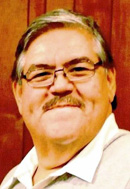By Ken Camp
Since Palm Sunday, Dan Trevino has preached to more than 10,000 immigrant young people from Central America, delivering a message of hope in Christ.
Trevino, associate pastor of Baptist Temple in San Antonio, Texas, leads multiple worship services each week for children, ages 11 to 17, detained at the Mexican border and housed at nearby Lackland Air Force Base. The U.S. Department of Health and Human Services shelter is operated by Baptist Child & Family Services.
He recognizes many Americans view the surge of unaccompanied minors from Central America as “a big political thing.” He sees the opportunity to share the gospel with the young people as “a divine appointment.”
Trevino joined the staff at Baptist Temple earlier this year after leaving the pastorate of Harlandale Baptist Church in San Antonio.
“Honestly, I was getting to the point where I was feeling ineffective in my ministry and doubting myself in terms of my ability as a preacher,” Trevino said.

Two weeks after he arrived at Baptist Temple, BCFS President Kevin Dinnin called him. Dinnin asked Trevino, who served 17 years with BCFS in a variety of roles, to conduct worship services at five camps throughout Central Texas where the agency was caring for the immigrant children.
“I had been wondering if God could use me as a preacher. And now God was using me to spread his word to all these young people,” he said.
For several weeks, Trevino traveled to the camps. Later, when the summer camp season was scheduled to begin, DHHS consolidated operations at Lackland.
Trevino leads four worship services every Sunday at the base — three for boys and one for girls. Total attendance varies, but most Sundays he preaches to anywhere from 1,000 to 1,400 young people.
Trevino listens to the stories the young people tell him about the life they left in Central America and the journeys they endured. Many talk about parents who wanted their children to have a better life.
One teenaged boy described an entire year spent walking from Honduras to Texas, working along the way to earn money for food. Another boy talked about violence in his homeland.
“He saw other kids executed right in front of him. He started running and didn’t turn back,” he said.
Based on their familiarity with the Bible, Trevino suspects many of the youth came from evangelical homes where parents taught them the importance of strong faith.
“What they need is a personal walk with Jesus. Many of them already know about God, but we want to build on the basics of what they know.”
Each week, Trevino extends an invitation to his listeners to make a faith commitment to Jesus. So far, more than 2,500 people have raised their hands, indicating they made professions of faith in Christ — including some staff.
Trevino acknowledges some see the expressions of faith as comparable to “jailhouse religion,” but he rejects that idea. Participants attend the worship services voluntarily, and many choose to join in weekday Bible studies.
Trevino takes care not to communicate a message “everything is going to be great” if they become Christians, but he assures them God will accompany them, whatever their future holds.
His sermons include a variety of biblical stories of faith and hope. But at every worship service, he leads the children in reading together Joshua 1:9 in Spanish: “Have I not commanded you? Be strong and courageous. Do not be terrified; do not be discouraged, for the Lord your God will be with you wherever you go.”
“Many may end up going back home,” Trevino said. “So, I tell them, ‘Bring revival to Honduras or El Salvador or Guatemala. … God has a plan for your life.’”
For decades, Trevino dreamed about preaching in Central America, but he never traveled any farther south than Mexican border cities along the Rio Grande.
“It just never happened. It never panned out,” he said. “But God has given me the desires of my heart. I don’t have to go to Central America. It has come to me.”
